Geznakh – BACK TO HAKKARI
http://www.shlama.be
Some stories are a mixture of good hope and wishful thinking. This is one of them. It deals with the Yaramis clan from the village of Geznakh in the mountains of eastern Turkey. They are Assyrian Christians who found asylum in Antwerp, Belgium. But they have never left their native area behind. This is a story about coming home in the spring of 2004. It is not the end, it is the promise of a new start in the old land. August Thiry – Photography : Geert Segers
Grandma Yaramis
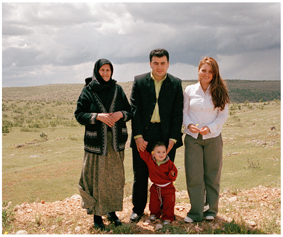
Yaramis family
Istanbul International Airport. Seventy-five year old Hatun Yaramis is in trouble. She is arrested at the passport control and has to go to the airport police. Her Turkish ID card has expired and she can only show a document from the Turkish consulate in Antwerp, stating that due to particular circumstances she left her native country in 1993. We are waiting for her in the transit hall and there she is at last, just in time for the next interior flight to Diyarbakir, SE Turkey. She comes back together with my travelling companion Melkan and her grandson Shenol, who has left his young wife Nursen with the baby in the transit hall. Problem solved. ‘The Turkish way,’ says Melkan with a broad grin. ‘Turkey wants to join Europe. So, the police got what they want: euros.’ It is a big relief for three generations: for grandma Hatun, for the young couple Shenol and Nursen, and for the middle-aged uncles, male relatives who carry suitcases and other heavy luggage. ‘They want us to come to Geznakh,’ says Melkan. They have invited us
Together with Melkan, an Assyrian Christian from Mechelen in the Flemish part of Belgium, I am travelling to SE Turkey. On the plane to Istanbul we met the Yaramis people, members of his family-in-law. It was pure coincidence. They were going back to the Hakkari mountains to rebuild their native village. It is called Geznakh and it is the place where Melkan’s wife is born. And so, the incident at Istanbul Airport has brought something good in the end: we will change our plans and visit the Yaramis people in Geznakh. ‘Life is hard in the mountains,’ says Melkan. ‘It will be nice to see how they are getting along there
Hatun Yaramis knows everything about hard life and misfortune. She was one of the last Christian inhabitants to leave Geznakh. That was in 1993, when the whole Hakkari region was ravaged as a consequence of the dirty war between the Turkish army and the Kurdish PKK-rebels. Hatun’s husband died during the difficult journey and he was buried in Istanbul. Together with her family she was granted asylum in Belgium. A new start perhaps, but not a rose garden. Five of her eight children are deaf-mute, a handicap which due to marriages within the own group frequently occurs in the family clan, and her most competent son died of cancer. Grandson Shenol, a young man in his twenties, now has to take over the family affairs and to act as the successor of his deceased father. Are the Yaramis people the only ones who are rebuilding Geznakh? Melkan smiles. ‘The whole village population is in fact one large clan, and they are all called Yaramis. A part of them is now living in the inner city of Antwerp, in the Stuivenberg quarter. But they always stick together and when some of them return home, others will surely follow
Feast on the Alp
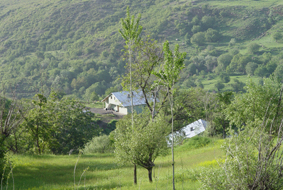
The Yaramis trio guides us on the last stretch of the road to the small mountain town of Beytüssebap, a Kurdish stronghold at the western edge of the Hakkari mountains. Our driver Mahmud stays behind, his car cannot go any farther. We join the Yaramis trio in their pickup truck that zigzags along the long and winding muddy road towards the high crests above. Geznakh lies on an isolated mountain terrace, surrounded by white peaks above three thousand meters. This must be the end of the world. A green alp with two new Swiss cottages, painted green, and a lower, flat-roofed house in grey stone. There are no streets. Footpaths wind to the slopes nearby, where the original mudhouses of the old village used to stand. They are now completely in ruins; only the scattered stones of the foundation are left. What do the Yaramis people hope to find in this mess? ‘Their real home,’ says Melkan, ‘and a view that they can get nowhere else, certainly not at flat and overcrowded Stuivenberg in the city of Antwerp
More members of the Yaramis clan come out to greet us. We get a warm and noisy welcome while the preparation of a big party is going on. They have invited their Kurdish neighbours from the other villages lower down, and all these guests assemble on the large alpine meadow behind the newly built cottages. The women, most of them unveiled, are wearing long dresses in bright colours. Among the men in their best clothes I notice some armed militiamen in military dress; they are sent by the agha to protect his people against attacks of PKK-terrorists from the Karacadag-mountainside at the high horizon
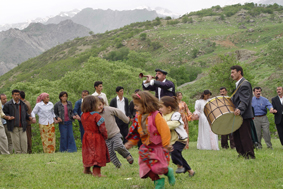
The feast has started. The bowels of slaughtered sheep cover the bank of the small stream on the edge of the alpine meadow. The meat is cooked in large iron cauldrons on wood fires. Suddenly the shrill melody of a flute sounds, together with the heavy beat from a large drum. Two musicians in traditional costumes lead the way for the male dancers who are moving, their shoulders pumping and shaking, in a large semicircular string. A Kurdish round dance apparently, and all the Yaramis-men present are happily taking part in it. The women – Kurdish and Assyrian – are sitting on the grass nearby and watch the spectacle. The food is ready. The men squat down in a circle and the foreign guests get the best part of the meat with pilaw rice. Then the women are served and at last the children, running from one group of grown-ups to the other, take what is left. In the meantime the weather is changing. Dark clouds cover the sky, it starts to rain. But the people on the Geznakh-alp don’t seem to feel the cold drizzle. The dancing starts again and now, covered up in the grey veil of the falling rain, young women approach the scene of the action and finally join the men. ‘Look at that!’ says Melkan. ‘Geznakh is alive again, alive and kicking
Fantastic People
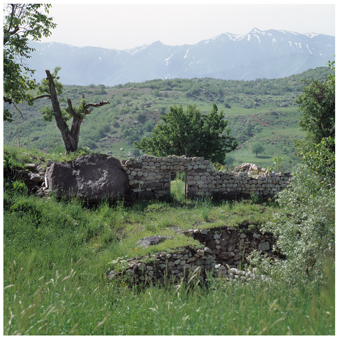
Facing the two newly built cottages there is a heap of stone blocks on a
small hill. It is the site of the old village church, which is now
completely ruined. Geznakh has always been the home of the Yaramis clan.
When in 1915 the Armenians and other Christians were massacred in
Turkey, the villagers of Geznakh had to flee as well and only after the
First World War they could return to their village. They went on living
as before, isolated from the outside world in their remote mountainous
area and without much contact with other Christians elsewhere in eastern
Turkey
More than half a century
ago the first priest or qasha came from the Bohtan plain, where the
Tigris flows, to Geznakh. He had a strange start in his new mountain
parish. The muhtar or village leader at that time showed him a
mysterious red book. Not a single villager could read what was written
in it, but anyone of them who swore an oath with his hand on the book
was considered trustworthy. The qasha recognized the magic book, it was
an old copy of the Peshito, the Bible in Old-Aramaic. While the
villagers gathered around him, the priest opened the Peshito and read a
short fragment aloud. The Geznakh people were astonished. They all knelt
down in front of him, they thought that God had sent His prophet to
them
During the Gulf war of 1991 Geznakh was almost completely deserted. A
large part of the Yaramis clan first went to Istanbul and then
emigrated from there and sought asylum in Belgium. During that difficult
period Melkan, also an Assyrian Christian and from his early childhood a
refugee from Turkey, learned to know them and acted as an interpreter.
‘Almost no-one of them could read or write. During the investigation and
the interviews in the offices of the Immigrants Registration Department
they sat there like nervous wrecks, trembling with fear. It was not
easy to make them tell the straight story of the bad years in Geznakh.
At last their case was fixed and they were allowed to stay in Belgium.
You should have seen it, the gratitude I got from them! On the other
hand, I must be grateful too. I found my wife in Antwerp, at
Stuivenberg. A beauty she is, and a true Yaramis
Bound to Return
Geznakh Hotel on a high mountainside at dusk. The village has never had electric power, the first Yaramis people who returned installed their own generator in a shed. Drinking water is pumped up. The toilet is a hole in the floor of the smallest room. There is hardly any furniture, we are sitting on carpets and on cushions against the wall in one of the newly built cottages. The Kurdish village guards have drunk their tea, they have taken their automatic guns and mumbling their salaam, they have wished us good night. We stay behind with our hosts
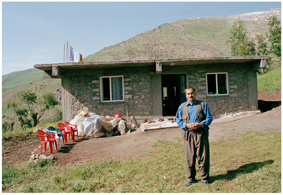
Yonan Yaramis has joined us. He lives in the older house in grey stone.
Yonan has always been the true village guardian. Only when times were
really hard, at the peak of the PKK-guerrilla, he moved from Geznakh to
the plain, to the town of Midyat, close to the Syrian border in SE
Turkey. That is the centre of the Tur Abdin area and a kind of Christian
enclave, at least what is left of it. Yonan was not happy there. ‘I
felt like a louse in other people’s fleece,’ he says. ‘So, I came back.
Here in Geznakh I can work as a farmer on my own land, I have my wife
and suns with me and the agha’s place is a full day’s journey further
down. Nobody tells me what to do. The winter is hard, but we are used to
it and we have our Kurdish neighbours. We just need more people, more
Yaramis families who want to come back to rebuild the village. I have
high hopes. I have heard the stories and I have listened well. They are
now living in Antwerp. The situation is bad there, there are many people
in that city who hate foreigners, all foreigners, and sooner or later
they will be kicked out. The Yaramis will come back, mind my words
Yonan wants a tractor. If he gets one, he will cultivate more land
and grow vegetables and plant fruit trees. He also counts on suppport
from the Turkish government: the road to Geznakh must be repaired and
the village must get electricity. The others, Yonan’s relatives,
interrupt him with derisive laughter. Does he really want the Turkish
army to come to Geznakh to build a karakol, an army barrack? Only then
the road will be fixed, so they say, only then the village will get
electric power… Yonan shrugs his shoulders
Khamo’s Way
Khamo Yaramis, the owner of the cottage where we will spend the night, is a hefty melik-type, an old headman with dark brown skin and clever, sharp-looking eyes. He knows the ways of the mountains and when he was younger he was even known in Geznakh for his arms smuggling. ‘That was a former life, a long time ago,’ smiles Khamo. In the nineties he was living in Antwerp and later on in the poor quarter around the Midi railway station in Brussels South. Brussels wasn’t such a happy experience and he has picked up just a few French expressions. Merde alors and baiser, or shit and fuck, are two of them
It was obvious that we were the guests of honour at the feast on the alp today. What called for that celebration? ‘That you have come to visit us,’ explains Khamo. ‘We have returned to Geznakh from Europe, but now Europe itself has come to us, and everybody here in the mountains will realize that the Yaramis Christians have powerful friends abroad. So, any villain will think twice before harming us! We are all grateful to your country, our people got shelter, housing and even welfare-money in Belgium. But our hearts are here, on our native soil. Senior people of Geznakh are like me: we can live with the Belgian winter, in these mountains that season has become too tough for us, but when spring comes, we feel the itch and then we want to be in Geznakh
A nice deal, so it seems. But what about the younger men? ‘They are saving money for new houses here, they are going to rebuild our church and as soon as there will be a school for the children, the women will come too.’ The young unmarried women also? Khamo grins, he knows everything about the trouble with women folk. When he was young, a long time ago, he had to abduct his future bride because her family was at first opposed to the marriage. ‘It happened all the time,’ says Khamo. ‘Kurds or Assyrians, Muslims or Christians – it was the way of the mountains.’ And today? ‘Who knows?’ says Khamo
Shenol, the grandson of Hatun Yaramis, has been sitting in a corner of the room without saying much. His young wife Nursen is feeding the baby, a little girl, from a bowl on the carpet. Shenol has savings, he owns a night shop in Antwerp. Next year he will come back to Geznakh to build his own house. Will his wife come too? Maybe, says Nursen, for a long stay in the summer, but she may be pregnant again and then it will be difficult. As a young child Nursen herded the goats in the village. Many families had already emigrated from Geznakh by then and today only the rubble of the old farmhouses on the green hill slopes is left, like ugly scars in the landscape. But the old folks of the Yaramis clan, the generation of grandma Hatun, have lived here and they want to be buried in the native soil of Geznakh. If all goes well, their wish will be fulfilled
One Year Later
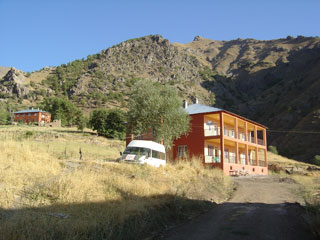
September 2005. This second journey to Geznakh is a piece of cake. Short delay at the Turkish checkpoints, the road to Beytüssebap is much better and in Geznakh three more houses have been built. The biggest one, painted in red, looks like a hotel with ample rooms and clean water closets. It is a home for three generations and it belongs to Shenol and Nursen. ‘You see, I have kept my promise,’ says Shenol. Nursen is pregnant again. Unfortunately, the old Yaramis handicap hasn’t disappeared: it has been diagnosed that Nursen’s little girl Louise is deaf-mute, she needs treatment. In Belgium, says Nursen. Or in Turkey, argues Shenol. He has sold his night shop and he wants to stay longer in Geznakh. There are also other children in the village this summer and more women too
Six houses have got their finishing touch and there are vegetable gardens and small orchards. ‘Taste those pears, they are from my own trees,’ says Yonan when he comes to greet me. No feast on the alpine meadow this time, foreign visitors are no longer a rare exception. I spend the night in Shenol’s house. There are other guests, Kurdish friends from Hakkari, but no armed village guards
How is the situation on Mount Karacadag? The PKK-men who are still there are deserters from the army, they are forced to go on hiding. Twice they came down at night. They had weapons and demanded food and money. The Turkish army at Beytüssebap found out what had happened and an army unit came to search the whole area. And that was that, so far
The next morning Shenol takes me back to Beytüssebap, where I left my rented car. Khamo comes to say goodbye and puts a large sack filled with walnuts in the back of Shenol’s minibus. The nuts will be sold in Beytüssebap. ‘My own harvest,’ says Khamo. A respectable landowner, so it seems. Geznakh has made him look younger, and happier
We ride downhill. The road is still very bad, but on the side we pass a team of workers and engineers who are digging the last holes for the poles. Very soon now Geznakh will get its electric power. On the way down Shenol regularly stops to give Kurdish villagers a lift. They are mostly women and children and Shenol drops them off in Beytüssebap. The relations with the Kurdish neighbours seem better than ever before
I take leave of Shenol and take the long road back to the plain. At Basaran I notice the Turkish flag above the trees next to the agha’s place. All quiet there, I don’t stop. Would the agha already have visited his Christian subjects in Geznakh? I forgot to ask. And how many of the villagers will really take the risk and resettle there permanently? Hard to tell. There is no school, the nearest one is in Beytüssebap. And the old church, the only one for miles and miles around, is still in ruins. So what? Geznakh has its mountains, its new houses and above all: its fantastic Yaramis people. Heaven can wait



